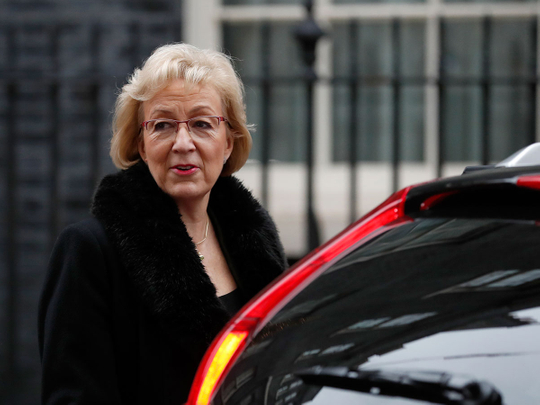
LONDON: Britain could seek to agree a further “minimalist” withdrawal deal with the European Union if British lawmakers reject Prime Minister Theresa May’s divorce agreement, House of Commons leader Andrea Leadsom said on Thursday.
Britain will leave the EU in 99 days time on March 29 and if parliament cannot pass the divorce terms agreed by May, Leadsom said a “managed” no deal withdrawal was an option.
“In the event that we cannot pass the prime minister’s withdrawal agreement … then what we will need to do is to look at what the alternatives are, and a managed no-deal where we collaborate with the European Union … would be an alternative solution that the European Union … might well find is also in their interest,” Leadsom told BBC radio.
“A managed no deal does not mean necessarily mean that there is no withdrawal agreement at all. What I am looking at is trying to find an alternative that in the event we cannot agree to this deal, that there could be a further deal that looks at a more minimalist approach … that avoids a cliff edge.”
UK Cabinet Minister Amber Rudd has suggested a second referendum on Brexit could be required, breaking ranks with Prime Minister Theresa May, who has ruled out the idea.
While stressing it’s not something she’s seeking, Rudd said in an ITV interview that if Parliament is unable to agree on a Brexit package, it may be the way to break the deadlock. She also said she favours a series of so-called “indicative votes” in Parliament to test whether there’s a majority of lawmakers who favour different options on Brexit.
“I don’t want a people’s vote or a referendum in general, but if Parliament absolutely failed to reach a consensus, I can see that there would be a plausible argument for it,” Rudd, the pensions secretary, told ITV’s “Peston” show late Wednesday. “It is incumbent on MPs to find the centre ground in Parliament and to try to find where the majority is there.”
@AmberRuddHR says that although it isn’t her first option, she can see a situation where there would be a plausible argument for a People’s Vote.
The U.K.’s Parliament begins its Christmas recess on Thursday, and won’t return until Jan. 7. May earlier this month postponed a parliamentary vote on the Brexit package she’s painstakingly negotiated with the European Union because she didn’t have the votes. Instead, she’s pledged to get extra reassurances from the bloc on the most contentious parts of the deal in order to secure the support of the pro-Brexit wing of her party and her minority government’s allies in Northern Ireland’s Democratic Unionist party.
“Whether we’re going to be able to get enough to satisfy them, I don’t know,” Rudd said. “I’m under no illusion that it’s going to be very difficult to get through, but I hope that people will take a careful look at the alternatives and conclude that they can back it.”
The prime minister has pledged to hold the deferred vote in the week beginning Jan. 14, and has also warned that if lawmakers reject it, they risk causing either a no-deal Brexit or no Brexit at all. Still, she’s repeatedly ruled out a second referendum, saying it would destroy public trust in politicians, who have a duty to implement the results of the first vote.
“Going back to people saying they’d got it wrong and had to try again would be unacceptable,” Leader of the House of Commons Andrea Leadsom said in an interview with BBC Radio 4 on Thursday. “It’s not government policy and I myself think it would undermine the biggest democratic exercise ever, where we had a clear majority to leave the European Union.”
Without parliamentary approval for May’s deal, the default path is for Britain to crash out of the EU without a deal on March 29. With that in mind, the government has been stepping up no-deal preparations — including asking supermarkets and drugmakers to stockpile goods and putting troops on standby.
‘Dire Consequences’
Rudd likened this to putting on a seat belt when getting into a car — a sensible precaution against an unlikely event. At the same time, she said, the preparations have revealed “the dire consequences” that would result from a cliff-edge departure from the bloc.
Nevertheless, the EU has also been outlining its preparations for no deal, ruling out the prospect of piecemeal negotiations on aspects of the divorce and instead protecting its own interests and putting in place a bare minimum of emergency measures.
Rudd, a stalwart of the Remain campaign in the 2016 referendum, returned to the Cabinet last month, half a year after being forced to quit as home secretary over accusations that she misled lawmakers on immigration targets. An interim investigation largely absolved her and blamed officials in her department.
— Agencies












